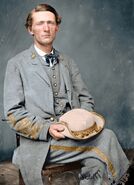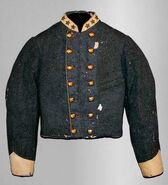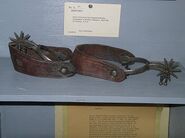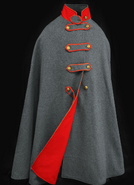
John Singleton "The Gray Ghost" Mosby (6 December 1833-30 May 1916) was a Colonel in the Confederate States Army during the American Civil War. The commander of the 43rd Battalion of the 1st Virginia Cavalry (Mosby's Raiders), Mosby was loved and feared by both sides during the war, and was called "the Gray Ghost" for his ability to elude Union forces. Later, he served as US Consul to Hong Kong under his former enemy, Ulysses S. Grant.
Biography[]
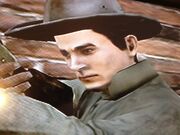
Mosby during a raid
Mosby was born in Powhatan County, Virginia, to an English-American family. He was originally a lawyer, but with the start of the American Civil War he became a Private in Grumble Jones' Confederate mounted riflemen, and was promoted to First Lieutenant by J.E.B. Stuart due to his impressive ability to gather intelligence. While a prisoner during the Peninsula Campaign, he spied on the Union authorities, finding out about Ambrose Burnside's expedition in the Carolinas, and he reported the news to Robert E. Lee. When he was released, Lee gave him the 43rd Battalion Virginia Cavalry, and he performed well as their commander. In March 1863, in a raid on the Fairfax Court House, he captured Brigadier General Edwin H. Stoughton, 30 troops, and 58 horses without firing a shot. Later, he raided Herndon Station on the Loudon, Hampshire, and Alexandria Railroad and captured troops and destroyed supplies.
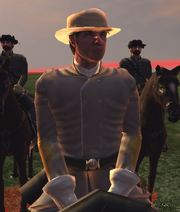
Mosby in battle
Mosby became such a threat that in 1864 Ulysses S. Grant ordered the execution of captured men of Mosby's Raiders. In November he negotiated with Phil Sheridan that the two sides would treat captured as prisoners of war, and Mosby's men would not be executed. On 18 November he defeated Captain Blazer's Scouts at the Battle of Kabletown, and gained more and more notoriety due to his raids. When, on 21 December he was shot in the abdomen through a window while dining with a southern family, he was believed to be dead, but survived and lived up to his reputation as a ghost.
After Robert E. Lee surrendered, Mosby disbanded his rangers on 21 April 1865. He attempted to meet up with Joseph E. Johnston's Army of Tennessee in North Carolina, but five days after the disbanding Johnston surrendered. Mosby did not formally surrender, but received a parole letter and quit fighting. From 1878 to 1885 he served as Consul to Hong Kong and from 1904 to 1910 he served as an attorney for the Department of Justice. He died in Washington, D.C.

